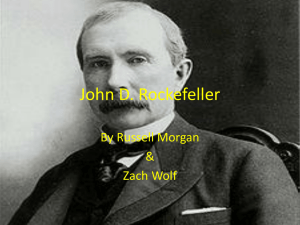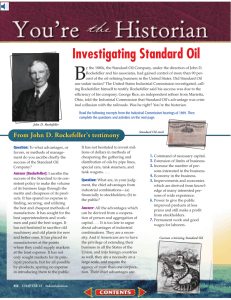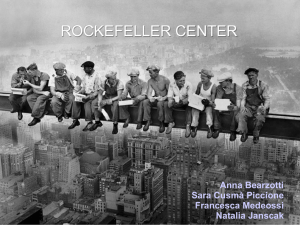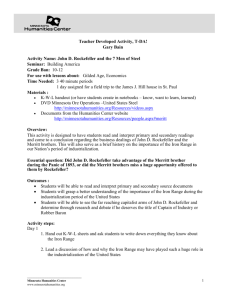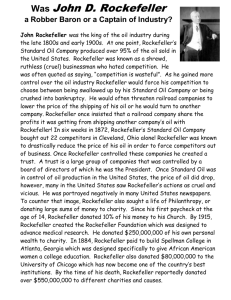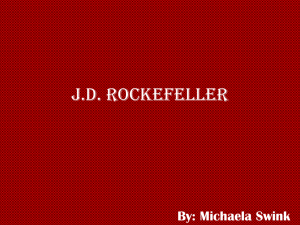Dochuk, Darren. Anointed With Oil: God and Black Gold in Modern
advertisement
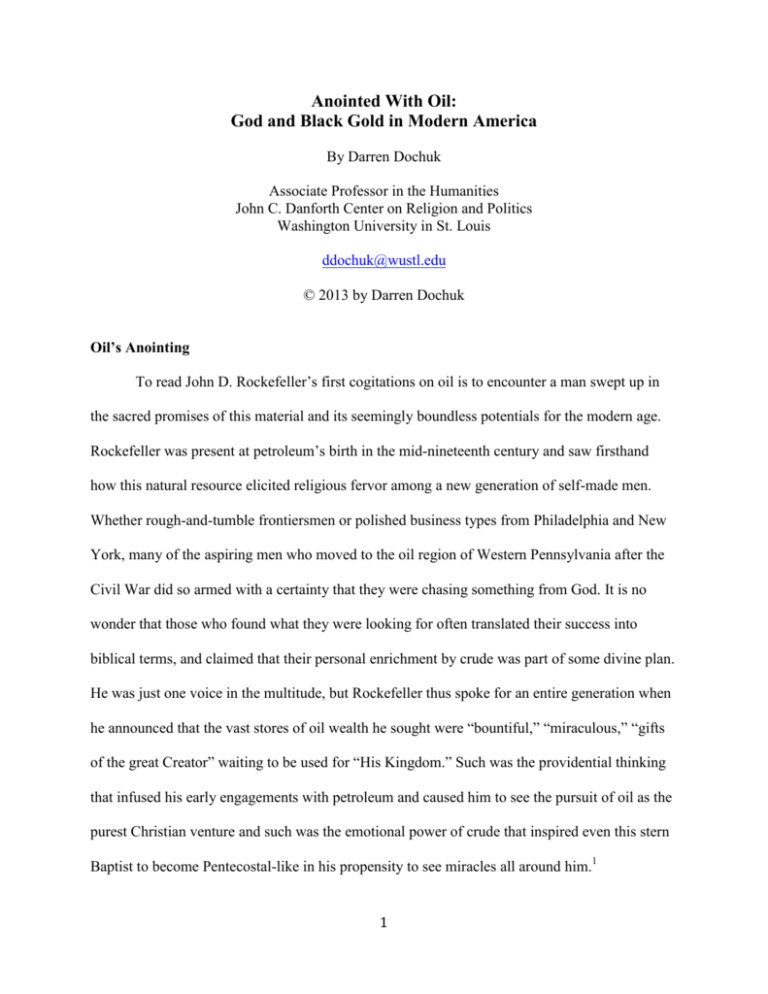
Anointed With Oil: God and Black Gold in Modern America By Darren Dochuk Associate Professor in the Humanities John C. Danforth Center on Religion and Politics Washington University in St. Louis ddochuk@wustl.edu © 2013 by Darren Dochuk Oil’s Anointing To read John D. Rockefeller’s first cogitations on oil is to encounter a man swept up in the sacred promises of this material and its seemingly boundless potentials for the modern age. Rockefeller was present at petroleum’s birth in the mid-nineteenth century and saw firsthand how this natural resource elicited religious fervor among a new generation of self-made men. Whether rough-and-tumble frontiersmen or polished business types from Philadelphia and New York, many of the aspiring men who moved to the oil region of Western Pennsylvania after the Civil War did so armed with a certainty that they were chasing something from God. It is no wonder that those who found what they were looking for often translated their success into biblical terms, and claimed that their personal enrichment by crude was part of some divine plan. He was just one voice in the multitude, but Rockefeller thus spoke for an entire generation when he announced that the vast stores of oil wealth he sought were “bountiful,” “miraculous,” “gifts of the great Creator” waiting to be used for “His Kingdom.” Such was the providential thinking that infused his early engagements with petroleum and caused him to see the pursuit of oil as the purest Christian venture and such was the emotional power of crude that inspired even this stern Baptist to become Pentecostal-like in his propensity to see miracles all around him.1 1 Rockefeller’s theological confrontation with crude is one vital piece of the story I seek to tell in my current book project. Based on a range of primary sources consulted at the Rockefeller Archive Center (RAC) and in several archives located across Canada, Europe, and the United States, Anointed With Oil: God and Black Gold in Modern America will, at its completion, track the intersecting histories of Protestantism and petroleum from the mid-nineteenth century to the present. Evangelical-minded oil hunters of Rockefeller’s ilk, those stirred up with spiritual ardor by the prospects of crude, figure prominently in this tale. One of my book’s central claims in fact is simply this: since oil’s beginnings in 1860s Pennsylvania to the present, and as witnessed on oil frontiers on this continent and abroad, oil hunters of all backgrounds and economic strata have often seen petroleum as their special providence, a fragile gift bestowed by God to advance his Kingdom. Such firm belief in oil’s benevolence has led to their strong action on its behalf, and all Americans have felt the effects. Assured by their ancient texts and cutting-edge technologies, and driven by notions of dominion over the earth and an unbending belief in the virtues of wildcat entrepreneurialism, these Christian crusaders have helped produce myriad structures of power with sprawling, global impact. While their financial clout and generous giving to religious institutions have helped clerics build thriving ministries and sacred empires, their religious commitments and close ties to communities of faith have allowed them to construct effective lobbies for oil-friendly policies at home and U.S. oil’s interests abroad. Moreover, through their open support of philanthropic foundations, interdenominational associations, and countless colleges, missionary agencies, and para-church organizations, these oil hunters, working in concert with church and civic leaders, have raised up generations of rankand-file Christian citizens whose attachment to petroleum has wavered little over time, assuring a bond that is as strong today as it was in Rockefeller’s day. 2 To be sure, this sense of custodial care and tight Christian allegiance to crude has always generated as much angst as hope. As witnessed in the chaotic circumstances that Rockefeller encountered in 1870s Western Pennsylvania, and the political backlash he endured in the early 1900s, during the boom-bust cycles of oil, Christian citizens have been reminded repeatedly that crude can also be a curse—that their “anointing” comes with a heavy cost. In no small way, tribulation has always plagued oil patch parishioners, making for a dramatic and often tragic tale. In post-Civil War Pennsylvania it came in the form of violent clashes between struggling producers and deadly conflagrations that burned buildings and family businesses to the ground. In turn-of-the-century California it came in cycles of rage between obstinate wildcatters and the frontier’s outnumbered law enforcers. In 1930s Texas it came in sequences of unimaginable heartbreak as boomtowns like New London dealt with the scent of death when gas in an underground pipeline turned their houses and schools into rubble, and graves for their children, and to be sure, this sense of custodial care has generated as much rhetorical handwringing as praise. Considering this track record of destruction, is it any wonder that oil’s dark side has always hastened a hermeneutics of damnation easily spoken by all? As Rockefeller’s clash with outspoken muckraker Ida Tarbell reminds us, oil patch Christianity has always been forced to confront petroleum’s dissenters, those who condemn America’s dependency on black gold and the excesses it seems to promote. Still, however scandalized by skeptics or dissent, America’s oil hunters and oil patch Protestants in general have overwhelmingly stayed true to the dictates of their faith in a God who prospers them with petroleum, and true to the political agenda that this theology entails. As my book seeks to demonstrate, discord, though real, has always succumbed to a discourse of destiny. Whether praying for oil’s bounty or for deliverance from its extremes—whether working on their 3 rigs and in their corporate headquarters to maximize oil’s proliferation, or in politics to rein it in—they have viewed their place in this sector as special. In determined fashion, they have created and ruled their own “Petrolia,” whose twin allegiances to God and black gold remain as strong and unbending today as they were when Rockefeller first expressed his joy at discovering petroleum’s potential for modern society and the realization of a more godly economic, social, and political order. The Rockefellers and Petro-Protestantism Though wide-ranging in its aims to tell a story from the “bottom-up” as well as “topdown,” and across boundaries of class, gender, race, and nation state, my book finds much of its adhesion in the histories of a few oil hunters and their families, none more important than the Rockefellers. As Daniel Yergin has masterfully explained, oil “is the world’s biggest and most pervasive business,” “the greatest of the great industries,” and the principal force behind geopolitics in the twentieth century. Oil, in short, is the handmaiden of modernity. It is understandable, then, that oil’s founding families have garnered so much scholarly attention, and that the Rockefellers have stood out from the crowd. Indeed, countless chroniclers have accounted for the Rockefellers’ unmatched authority in modern American economics, politics, and culture; in this sense my book joins an already vibrant literature. Yet very few historians have traced a textured history in which Rockefeller involvement in these “secular” spheres and their impact on American religion unfolds simultaneously as an integrated whole. Anointed With Oil seeks to chart this course by weaving the long sagas of modern American petroleum and Protestantism together in one thick thread. With the help of recent research at the RAC (and additional research planned for the near future), this innovative approach will, I believe, meet with success.2 4 My initial investigation of RAC sources, carried out in the fall of 2012, did indeed bear fruit, in at least two important ways. First, my examination of John D. Rockefeller, Sr. (JDR) and some of his early religious and business commitments gave me access to the rough-and-tumble local environments of late nineteenth-century Pennsylvania oil, the rapidly fragmenting denominational politics of mainline Protestantism, and the mind of a devout Baptist layman who seemed to wrestle with the challenges of Christian practice on a daily basis. Though subjected to scrutiny from all sides, and ridiculed by critics for his use of the New Testament to justify his acquisition of wealth, Rockefeller was at his core a deeply spiritual man who saw all facets of his life in holistic terms as an extension of his faith. David Rockefeller stresses this very point when pausing in his recent autobiography to describe his grandfather. “He was a devout Christian,” the grandson explains, “who lived by the strict tenets of his Baptist faith. His faith ‘explained’ the world around him, guided him on his way through it, and provided him with a liberating structure.” He adds: Grandfather wore the commandments of his religion, all the things that would seem to us such burdens, with ease and even joy. He was the least dour man I have ever known; he was constantly smiling, joking, and telling shaggy dog stories. Often at dinner he would start to sing softly one of his favorite hymns. He wasn’t singing to anyone; it was as if a feeling of peace and contentment were welling out of him. Strikingly at odds with muckraking accounts and the stinging stereotypes of him that stressed his calculating side, JDR saw himself first and foremost as a disciple of Christ whose ultimate aim, and responsibility, was to honor his Maker. This is how his family viewed things, and though their subjective view deserves scrutiny too, theirs is a perspective that historians must take seriously in their rendering of the Rockefeller past.3 One reason why is because JDR’s actions in industry—in oil—bore the mark of his Christian devotion. He may have been a bit of a romantic when it came to sharing his faith with 5 others through song, an impromptu sermon, and regular displays of strict living, but he was also Puritan through and through. The most crucial of his grandfather’s spiritual values, David Rockefeller insists, “was that faith without good works was meaningless.” The doctrine of stewardship—applying God’s gifts of talent, wealth, and opportunity to the swift and efficient construction of a divine Kingdom—informed Standard Oil’s founder in every regard, and charged his business practices with a sense of urgency and ultimate purpose. His quest was not to revel in the enchantments of crude, (though as indicated by his own musings he left some room in his life for ecstatic responses both to God and black gold) but to bring continuity to his business and ensure its proficient use on behalf of God’s designs. Some of his critics saw this tendency to control at all costs as a departure from his faith. Even Ida Tarbell could not help but marvel at JDR’s Protestantism, yet she was equally struck by his apparent willingness to abandon it for power. “There was no more faithful Baptist in Cleveland,” she wrote with some wonder; “every enterprise of that church” was partly his doing. “Yet he was willing to strain every nerve to obtain for himself special and unjust privileges … bound to ruin every man in the oil business not sharing them with him.” In Tarbell’s estimation, JDR was a hypocrite, yet in reality there was little that was contradictory about his generous spirit on the one hand and unbending pursuit of power on the other. He was, rather (borrowing from sociologist Max Weber) the Calvinist forerunner of modern Protestantism and capitalism, who sought to impose doctrinal order on church and market through application of rational profit-motives, and who desperately wanted to stamp out (or at very least subdue) the speculative dimensions of his corporate and ecclesiastical realms so as to guarantee better yields, and God’s will, in both.4 My initial foray into RAC sources pertaining to JDR bore this out. Through a close reading of the “John D. Rockefeller Interview, 1917-1920,” conducted by William Inglis in the 6 wake of Rockefeller’s clash with Tarbell, I was able to glean further insight into the religious thinking of the oil titan as he reflected on his past successes and challenges. This source will continue to be of great use as I further process Rockefeller’s early life in oil. During his violent and prolonged struggle with Pennsylvania’s producers, JDR fashioned himself in rather messianic terms as a “godsend,” and his company as “an angel of mercy, reaching down from the sky and saying [to struggling competitors] “Get into the ark. Put in your old junk. We’ll take all the risks.” His competitors viewed things differently, of course, and borrowed the same scriptural lingo to describe him as the “head devil,” but Rockefeller brushed off such language as the sign of desperation, and anti-modern remnants of yesteryear: “Providence,” he insisted with little compunction, was on his side, modernity his to mold. As I saw evidenced while reading through Rockefeller’s Letterbooks, personal notes to the many religious leaders with whom he was in steady contact (including famous ones like revivalist Dwight L. Moody), his correspondence with Henry Flagler and Samuel Andrews, and his brother William, this assurance permeated all aspects of his business, and essentially made his labor in oil an exercise in devotion. Though exceptional for its effect, my thesis is that his faith-inflected self-possession was a common trait on U.S. petroleum’s earliest frontiers.5 My readings through some of the rare books found in the RAC’s extensive library drove this point home, and allowed me to contextualize it within the broader world of nineteenthcentury oil culture. Early published texts such as John T. Flynn’s God’s Gold: The Story of Rockefeller and His Times (1932) were especially helpful, in this regard. Many of JDR’s advisors at Standard Oil, and peers in other oil companies, were sons of ministers who translated their fathers’ sensibilities into a sense of mission, and justification for their work in petroleum as if it was blessed by God. “No one can read the records of the oil regions,” Flynn aptly writes, 7 “without gathering the impression that the men there had come to think that they had a right— some kind of God-given right—to exploit the oil industry for their own advantage.” It was the “hand of God,” not some invisible hand in the marketplace, they believed, that determined their success at locating new pools, building corporate powerhouses, expanding their empires, and fueling humanity’s advance towards a new dispensation. Its smell, its touch, and its mysterious and ancient origins: each of oil’s distinctive characteristics tantalized Rockefeller and his contemporaries in a way that coal and other illuminants, fuels, and natural resources did not; it was special, and it was supernatural, and it was something to be harnessed for humanity’s ultimate good.6 John D. Rockefeller, Jr., (JDR Jr.) shared this same conviction, and confidence in an active, omnipotent God, and even more than his father, he sought ways to make faith—an immanent Being, in human compassion, in science and technology, and in oil’s unique capacities for society’s progress—a clear priority of his family’s mission. A second area in which my research at the RAC produced fruit was in its examination of JDR Jr.’s philanthropic outreach, which bore the clearest mark of his faith-based initiative. Of course his vision to turn oil wealth into a charitable outreach on a massive scale was not his outlook alone. His father had begun seeing things this way during the later stages of his life when distributing profits to worthy causes became a mandate. Indeed, during my research at the RAC I spent considerable time working through the relatively compact, but content-rich papers of Frederick Taylor Gates, the man who started shaping JDR and his offspring into a philanthropic force. Like his boss, Gates was a devoted Baptist who took seriously the New Testament’s charge for individual Christians to give generously—time, energy, and especially money—for the betterment of man. More than that, he 8 adhered to a type of social gospel, which held that the very salvation of an individual was indelibly tied to the salvation of society, that one’s spiritual health and worth could only be enhanced through the increase of all. As a cleric, Gates knew his doctrine well, but it was his business savvy, driving passion, and obsessions with efficiency that made his role as JDR’s investment adviser and head of the Rockefeller Foundation (RF) so important. Gates’s papers, particularly his (and his friends’) musings on the “spirit of true religion” and its functions for the progressive age, reveal a man who approached his professional and personal dealings in the same holistic way as JDR: as a quest to rationalize and bring order to society, ground faith in action, and through cooperative, ecumenical efforts, extend the gospel of Christian democracy—and capitalism—on a global stage. His burden was the same as JDR’s as well: to use oil to “illuminate” and “enlighten” the world and nudge all people towards universal brotherhood. Even after Gates conceded leadership of the RF to JDR Jr. in the 1910s, he continued to channel Standard Oil funds into several global enterprises on behalf of various religious and medical organizations. Gates left his heaviest mark on China through the designs of the China Medical Board (CMB), which transferred the energies of the formidable Protestant missionary enterprise in China toward expansion of modern (secular) medical education. By way of firsthand observation he saw missionaries (many funded by the Rockefeller Baptist establishment) trapped in “ignorance and misguided sentiment,” and so he directed his valuable support to the medical practitioners he believed to be more cosmopolitan, informed, and modern. By the 1920s Gates’s journey from cleric to secular humanitarian was complete.7 If Gates viewed his role as the RF’s chief executive in vocational terms, JDR Jr. embraced his place at the head of Rockefeller charity as existential. As he struggled to live up to the pressures of being Senior’s son and the heir (rather than the creator of) a family fortune, 9 Junior began looking elsewhere for a sense of purpose and found it in the realm of philanthropy. If he could not command the same authority as his father did acquiring money, he would command it by doling it out. In another important way, though—firm religious belief—JDR Jr. mirrored his father, and it is out of this shared wellspring of conviction that his philanthropic ambitions grew to exceed Gates’s or anyone else’s during the first half of the twentieth century. During his lifetime, he truly etched his name in history by using oil profits to fund a sweeping array of nonprofit initiatives that impacted cultural sectors ranging from modern art to Baptist missions, and communities as near as Pocantico Hills, New York, and as far as Peking, China. In doing so, he became the ultimate pace-setting example of what petro-patriarchs and petrophilanthropy could do to alter global development; others in his line of work, from the Mellons (Gulf) to the Pews (Sunoco) would do their best to follow suit.8 My research visit to the RAC allowed me to begin mapping out JDR Jr.’s expansive universe of philanthropy. This universe is far too vast to survey, let alone measure, the range of sources too numerous to tackle on any one visit, but my initial entry into Rockefeller’s charitable efforts did allow me to address a few pressing curiosities foundational to my current writing. In the first place, I targeted files that offered a glimpse of JDR Jr.’s generosity within his own denominational (Northern Baptist) context. Concentrated attention on the “Religious Interests” Series of the Rockefeller Family Archives proved immensely helpful in this regard, and my findings in this set of papers will serve as the foundation for much of my coverage of the Rockefellers’ religious and philanthropic legacies in the twentieth century. Through correspondence, memos, and clippings located in these files, I was able to chart how JDR Jr. helped advance the Northern Baptist Convention’s (NBC) increasingly broad range of ministries in the United States and abroad. Although he was less overtly “evangelical” or conservative in 10 his Protestant persuasions than his father and leaned heavily to the progressive liberal side of his faith’s tradition, Junior remained committed to his family’s religious heritage. Well into the 1920s he continued to give freely to the NBC, offering generous portions of Standard Oil stock to offset denominational costs, and by the 1940s the practice had hardly abated. In one transaction in April 1944, he gave 1,925 shares of Standard Oil Company, New Jersey to the NBC, amounting to $101,904.69. This was just one of many openhanded exchanges.9 The most well known dimension of JDR Jr.’s religious expression of course, is his ecumenism. My preliminary research at the RAC gave me the chance to explore this second essential dynamic in his spiritual biography. Amid World War I’s violence and the brutality he saw firsthand on the mining frontiers of the American West, he seemed to grow more determined—more desperate, even—to use petroleum profits to sell humanitarianism and a doctrine of cooperation and peace. Certainly he was already predisposed to this type of progressive, internationalist outlook, and prior to the war, through Rockefeller initiatives like the creation of the University of Chicago, acted upon it in substantive ways. However, it was during the Interwar period that he came into his own as a visionary for this doctrine, and his accomplishments during this time bore testament to it. Promoting the League of Nations, funding the Council on Foreign Relations, and encouraging the creation of the United Nations: these and other causes captured his imagination, and in turn benefited immensely from his substantial involvement. More importantly for my book, however, is the way that Rockefeller’s ecumenical Protestant outlook compelled him to look beyond Baptist boundaries to the potentials of a much larger, much more inclusive and diverse Protestant community. During this period he followed an aggressive plan of building liberal Protestant agencies like the Interchurch World Movement 11 and Federal Council of Churches, and with family friend Reverend Henry Emerson Fosdick he made these organizations, and the Rockefeller-funded Riverside Church and Union Theological Seminary in Manhattan, the epicenters of progressive Protestant thought and action, in a way that would entirely transform American religion. My RAC work drew me into the correspondence and memos and back-and-forth exchanges between Rockefeller, Fosdick, and their fellow champions of ecumenism, and out of this exploration came a much deeper appreciation of the petro-philanthropist’s earnestness to broaden his church’s reach. As far as he was concerned, broadening in no way meant compromising, and he held firm to the belief that even serious Baptists could answer the challenges of modernity through cooperation with people of other orthodoxies, provided they soften their hearts and let go of dogmatism.10 Not all serious Baptists appreciated this viewpoint, however. The third curiosity that guided me through JDR Jr.’s papers concerned his participation in the heated “FundamentalistModernist” controversy that flared up in American Protestantism between the 1920s and 1940s. This conservative-liberal split has received a surfeit of scholarly attention, particularly from religious scholars, yet never within an integrated history of religion and oil. Working through these papers I was struck by the expansiveness of the populist uprising that Rockefeller helped agitate in his denomination by trying to nudge (through generous giving and public declaration) his church to the ecumenical left. Even as his giving to the NBC continued at a regular pace, worry among some of his fellow liberal churchmen intensified—worry that checks bearing his name were exacerbating the backlash by fundamentalist brethren. Rockefeller grew aware of the problem, and tired of it, and through the late 1920s and 1930s started pulling back from traditional Baptist ministries, including foreign missions, and donating with anonymity. Loyal to the faith of his father, he continued to lobby for Baptists and their evangelistic ministries, 12 including interdenominational ones run by high-profile evangelists like Billy Sunday, with whom he stayed in contact, and he always welcomed regular updates from his allies in the church, especially those that promised long-term liberal victory over fundamentalism. Yet, in accelerated fashion, his focus turned to those initiatives that mattered most to him: constructing interfaith movements that sought to break rather than buttress old patterns, and in his mind, old prejudices.11 While fascinating, and certainly vital to my task of tracing Rockefeller influences on American Protestantism through the twentieth century, JDR Jr.’s role in the liberal-conservative controversy is less significant than the actions of those churchmen who despised him. As I surveyed his records I encountered numerous exchanges between him and his detractors, those who by the 1920s identified as fundamentalists and by the 1940s utterly condemned him for leading the church astray. Their criticisms came clouded in rage that revealed animosities beyond the theological; class hatred for “Big Oil” factored in as well. In the thick of the fundamentalistmodernist debates of the 1920s, Rockefeller faced fierce opposition from outspoken conservatives who decried his suggestions to reorganize and modernize the NBC’s ministerial offerings (to make them more business-efficient) as a ploy to make the NBC “a religious department of the Standard Oil Company.” Rockefeller met such criticism at each new step he took to broaden Baptist ministries internationally, and by the early 1940s the censures had reached a feverish pitch. Rockefeller’s enthusiasm for Protestantism’s globalization was evidenced in a speech he delivered in 1945 to the ecumenical Protestant Council of New York. Many saluted his remarks, several on the religious Right decried them, including a Baptist from Missouri who denounced him as a wayward brother: Dear Christian Brother: I have read with amazement your address mailed to me; of course I had read the quotations from it in the Press. If it were not for the memory of the worthy 13 deeds of your noble Baptist father, I would find your LIBERAL remarks almost amusing. But in the shadow of his memory, I find them sadly sobering. I could wish that you had returned to a respect for the eternal verities of our New Testament Faith as it seems Dr. Fosdick has. Its [sic] amazing to see how much an Oil man can tell us Ministers. I am so glad to know that there are so many things which you do not know, otherwise you would not have spent money badly needed among our Baptist churches to circulize [sic] the group of hard-working loyal Baptist ministers who still prefer the Bible to the program of the Federal Council of Churches. With every good wish I am—one of that narrow ignorant group of Graduates of William Jewell College and the Southern Baptist Theological Seminary. Despite his best efforts to carve out a path of his own, JDR Jr. was, at least in this man’s opinion, his father’s son—a Standard Oil oilman, out of touch with the people. Worse yet, he was a Standard Oil oilman who had abandoned the absolute truths of the Baptist tradition.12 Future Directions This Missourian’s letter to JDR Jr. was typical for its highly charged religious and political expression, and strong opinions about Standard Oil’s first family, which I saw evidenced throughout the Rockefeller papers and corresponding collections—those, for instance, pertaining to Frederick Gates and Harry Emerson Fosdick. As I move my research and writing forward I intend to explore these intense responses to the Rockefellers in deeper and broader ways, and make sense of them in the intersecting histories of modern Protestantism and petroleum. Additional research at the RAC, combined with extensive work in other church and community records, and oil collections, (those charting oil families such as the Pews, for instance) will make this possible in at least a few different ways. My initial visit to the RAC already set these new directions in motion. Although time was short, some spare moments were reserved for a brief exploration of the third generation of Rockefellers and their extensive philanthropic efforts, economic and political connections to post-World War II global markets, (especially those opened up by Standard Oil’s successor 14 companies) and ties, however loose, to organized religion. Nelson A. Rockefeller’s (NAR) extensive business and political dealings in Latin America and John D. Rockefeller 3rd’s (JDR 3rd) continued support of religious mobilization in the 1950s and early 1960s (including evangelical mobilization on behalf of Billy Graham) were among the targeted subjects, all aided by a brief survey of relevant sections of the family papers (especially JDR 3rd and NAR Papers). During my next visit I hope to delve deeper into NAR’s activities in South America, which at times, and in important places, dovetailed U.S. missionary and petroleum attempts to gain influence in the region, and also to measure his political campaigns in the 1960s and 1970s, which brought political and religious divisions to the forefront within the Republican Party.13 Much of my book’s narrative tension will in fact stem from its treatment of the ongoing divide between pro and anti-Rockefeller forces within American petroleum and Protestantism; those that first surfaced in JDR’s day and that steadily escalated throughout the twentieth century, (witnessed in the Missourian’s letter) leading in part to Barry Goldwater’s defeat of NAR in the 1964 Republican primaries and ultimately the rise of a Sun Belt-led Reagan revolution. In this second course of action I will profile another prominent Christian oil family, the Pews, who like the Rockefellers used their oil company (Sunoco) to fund several Protestant causes. The three-generations-old contest between the Rockefeller and Pew families started in the 1880s when Joseph Pew, Sr.’s company struggled under the weight of Standard Oil’s dominance. JDR once said that “The principles of centralization, savings and service have operated, as we always believed they would, for the benefit of the whole people, and these detractors have faded away, grown smaller and smaller until you can’t find them with a glass.” The Pews, however, prove otherwise. Angered by Rockefeller’s quest for centralized power, determined to fight the leviathan, they most certainly did not fade away. They survived and 15 ultimately thrived by shifting their efforts to Texas, which in the wake of the Spindletop discovery of 1901, became the hub of American oil and the brand of evangelical Protestantism that JDR Jr. and his sons would forcefully reject (and in NAR’s case, come to abhor). For the next century Pew Sr.’s sons and nephews would shape Sunoco into a viable independent midmajor oil company, and a leading supporter of conservative political and evangelical Protestant causes, all in an effort to rollback (or at least minimize) Rockefeller influence.14 A third future direction of my research is related to the second, and it has to do with region. Sunoco’s strengths were directly tied to its extractive successes in the Southwest, set apart from the Rockefeller strongholds of the Northeast. In addition to charting the PewRockefeller corporate, political, and religious rivalry through further examination of both families’ archival materials and the charitable foundations both clans established to promote their particular brands of Protestant philanthropy, I will also seek to flesh out the realities of life on the oil frontiers—the oil patches of Texas, Oklahoma, Mexico, the Middle East, and various global settings where Standard Oil (and its post-1911 successors), Sunoco, and their major and midmajor competitors vied for supremacy. In this context I will look at the varying religious organizations that large companies like Standard Oil and Sunoco set up to preserve order on the often chaotic, boom-bust landscapes of the extractive zones. By following the life stories of geologists and wildcatters, many of whom, like John Carter, worked for Standard Oil, I will detail how oil hunters well into the twentieth century continued to search out new pools in distant lands equipped with a potent theology of destiny that allowed them to make sense of their journeys, the soil, and the mystical substance they were chasing. Finally, with the help of Rockefeller and Standard Oil records housed at the RAC and elsewhere, I will also attend to the lives of the roughnecks and roustabouts. Oil workers can be a tough breed, with a code for living 16 that clashes with the ethics of oil elites, and the pushback between these parties is something that will further enliven my story. There is no doubt that petro-Protestantism’s elite, led by the Rockefellers and Pews, have shaped their movement from above, but petro-Protestantism’s rank and file has had a say too. Editor's Note: This research report is presented here with the author’s permission but should not be cited or quoted without the author’s consent. Rockefeller Archive Center Research Reports Online is a periodic publication of the Rockefeller Archive Center. Edited by Erwin Levold, Research Reports Online is intended to foster the network of scholarship in the history of philanthropy and to highlight the diverse range of materials and subjects covered in the collections at the Rockefeller Archive Center. The reports are drawn from essays submitted by researchers who have visited the Archive Center, many of whom have received grants from the Archive Center to support their research. The ideas and opinions expressed in this report are those of the author and are not intended to represent the Rockefeller Archive Center. ENDNOTES: John D. Rockefeller’s reflections on faith and oil are evident in the John D. Rockefeller Interview, 19171920, conducted by William O. Inglis. A few of these observations are quoted in Ron Chernow, Titan: The Life of John D. Rockefeller, Sr. New York: Random House, 1998, pp. 76-77, and p. 80. For brief overview of the ideological, institutional, and political relationship between oil and religion see Darren Dochuk, “Blessed by Oil, Cursed with Crude: God and Black Gold in the American Southwest.” Journal of American History 99 (June 2012), pp. 51-61. 2 Daniel Yergin, The Prize: The Epic Quest for Oil, Money, and Power. New York: Simon & Schuster, 1992, pp. 13-14. One of the few books in an ever-expanding oil studies literature to pause for serious consideration of Rockefeller’s religiously inflected understandings of petroleum is Ron Chernow’s, Titan. 3 David Rockefeller, David Rockefeller Memoirs. New York: Random House, 2003, pp. 7-8. 4 Ida M. Tarbell, The History of the Standard Oil Company. (briefer version edited by David M. Chalmers) New York: W.W. Norton, 1966, p. 44. For deeper and more colorful insight into the TarbellRockefeller tension see Steve Weinberg, Taking On The Trust: The Epic Battle of Ida Tarbell and John D. Rockefeller. New York: W.W. Norton, 2008. One of the liveliest literatures in current U.S historiography is that which deals with the jarring developments of modern capitalism that Rockefeller dealt with in his time. See, for instance, Jonathan Levy, Freaks of Fortune: The Emerging World of Capitalism and Risk in America. Cambridge, Massachusetts: Harvard University Press, 2012. 5 John D. Rockefeller Interview, conducted by Inglis, 2, p. 48 and p. 56. 6 John T. Flynn, God’s Gold: The Story of Rockefeller and His Times. New York: Harcourt, Brace and Company, 1932, p. 121 and p. 149. 7 For insight into Gates’s thinking and his sense of vocation see “Fundamental Principles of Philanthropy.” (1908), Frederick T. Gates Papers, Box 2, Folder 26; See also “Letter on Missions” (n.d.), Frederick T. Gates Papers, Box 2, Folder 48; and “The Spirit of True Religion” (n.d.), Frederick T. Gates Papers, Box 3, Folder 67; See also Frederick Taylor Gates, Chapters in My Life (1977). See also John S. Baick, “Cracks in the Foundation: Frederick T. Gates, the Rockefeller Foundation, and the China Medical Board.” Journal of the Gilded Age and Progressive Era 3, pp. 59-89. 8 Rockefeller, David Rockefeller Memoirs, p. 19. 1 17 See “Memorandum, April 28, 1944, Arthur W. Packard to Mr. John D. Rockefeller, Jr., Rockefeller Family Archives, RG 2, Religious Interests, Box 9, Folder 60. 10 See “Memo for Files; Subject: Northern Baptist Convention, January 31, 1933,” Rockefeller Family Archives, RG 2, Religious Interests, Box 9, Folder 59. 11 See W.H. Bowler to W.S. Richardson, May 28, 1929, Rockefeller Family Archives, RG 2, Religious Interests, Box 9, Folder 58. Office of JDR, Jr. to Dr. W.H. Bowler, October 21, 1930, Rockefeller Family Archives, RG 2, Religious Interests, Box 9, Folder 58. Memo for Files; Subject: Northern Baptist Convention, January 31, 1933, Rockefeller Family Archives, RG 2, Religious Interests, Box 9, Folder 59. Albert L. Scott to Mr. John D. Rockefeller, Jr., May 30, 1933, Rockefeller Family Archives, RG 2, Religious Interests, Box 9, Folder 59. Rockefeller, Jr. and Billy Sunday maintained correspondence into the 1930s. By then Billy Sunday was a shadow of his fiery self, and on the decline, but that did not stop him from conversing with Rockefeller as an equal. In one letter in 1930 he wrote Rockefeller (addressing him with “Dear John”) suggesting the name for a new gasoline—“Murculine,” combining “mercury” and “gasoline.” Sunday hoped for some compensation in return, but also signed off with a typically warm word: “Best to you and your estimable wife and children and to your good old Dad. I have dreamed God will let him live to be 101 years old. I am as ever your friend.” Junior thanked him for the suggestion, explained that he had nothing to do with the oil-side, and wished him the best. See Billy Sunday to Mr. John D. Rockefeller, Jr., (n.d.) 1930, Rockefeller Family Archive, RG 2, Religious Interests, Box 92, Folder 745; and John D. Rockefeller, Jr. to Billy Sunday, August 19, 1930, Rockefeller Family Archives, RG 2, Religious Interests, Box 92, Folder 745. David Rockefeller sees his father’s turn towards a more liberal Protestant sensibility occurring in part during a 1920s trip to China. There John D. Rockefeller, Jr., came in contact with missionaries, many of whom were funded by his Baptist tithe, and grew worried that their methods of addressing China’s struggles with modernization were insufficient. More science and more ecumenical exchange were needed. See David Rockefeller, David Rockefeller Memoirs, p. 244. 12 See “Assails Rockefeller Plan: Dr. Shields, President of Northern Baptist Convention, Says Ideas Is to Make the Organization a Religious Department of the Standard Oil Company,” Boston, Massachusetts Manuscript (March 11, 1927), clipping in Rockefeller Family Archives, RG 2, Religious Interests, Box 9, Folder 62. Victor Connelley to John D. Rockefeller, Jr., March 12, 1945, Rockefeller Family Archives, RG 2, Religious Interests, Box 53, Folder 418, Box 53. 13 My research in this area of concern will take me deeper into the Rockefeller Family Archives, RG 4, Nelson A. Rockefeller records charting various projects for economic development (some concerned with oil), social and political reform, and democratic action. 14 Inglis Interview, 87. The Rockefellers and Pews did not always or necessarily disagree on religious matters. Though J. Howard Pew, Sunoco’s chief officer through much of the twentieth century, was a staunch conservative Presbyterian and viewed the Rockefellers as too liberal in their Baptist faith, he did reach out to them at times for coordinated religious initiatives such as revivalism. This, at least, was the case in the late 1950s when he corresponded with John D. Rockefeller 3rd about supporting Billy Graham’s 1957 New York City religious meetings and Christianity Today, a conservative evangelical magazine started by Pew and Graham in the 1950s. See, for instance, J. Howard Pew to Mr. John D. Rockefeller 3rd, June 3, 1957, Rockefeller Family Archives, RG 2, Religious Interests, Box 53. 9 18
